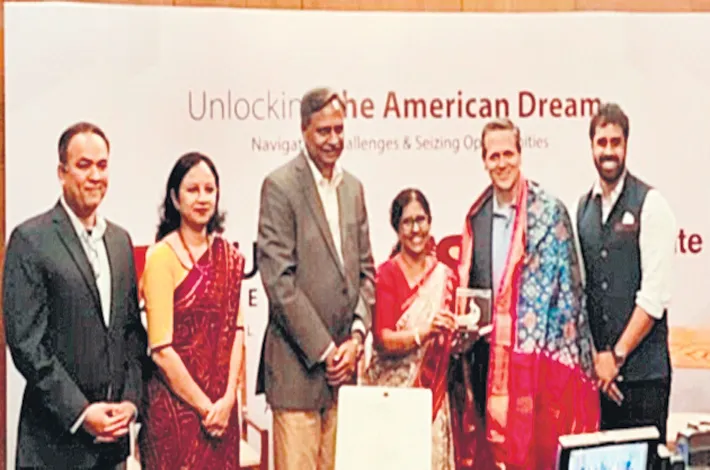The need and importance of faith in God in the Indian context
18-04-2025 12:00:00 AM

While faith in God is a source of strength, it is not without challenges. Misinterpretations of religious teachings can lead to superstition, intolerance, or communal strife. To harness the positive potential of faith, India needs to promote interfaith dialogue, education, and inclusive spiritual practices. Encouraging critical thinking alongside devotion can ensure that faith remains a force for good, fostering harmony rather than division
India, a land of vibrant diversity, is deeply rooted in spirituality and faith. With a rich tapestry of religions, cultures, and traditions, faith in God has been a cornerstone of Indian society for millennia. From the ancient Vedic hymns to modern-day devotional practices, the belief in a higher power permeates every aspect of life in India. In the Indian context, faith in God is not merely a religious practice but a way of life that provides emotional strength, moral guidance, and societal cohesion. This article explores the need and importance of faith in God in India, emphasizing its role in personal growth, community harmony, and navigating contemporary challenges.
A Historical and Cultural Anchor
India’s spiritual heritage is one of the oldest in the world, with texts like the Vedas, Upanishads, Bhagavad Gita, Quran, Bible, and Guru Granth Sahib shaping its religious landscape. Faith in God has historically been a unifying force, offering solace during invasions, colonial rule, and socio-political upheavals. Temples, mosques, churches, and gurudwaras stand as testaments to the enduring belief in divine power, serving as centers of worship and community bonding.
In the Indian context, faith is not confined to organized religion but extends to personal and familial practices. Daily rituals, festivals like Diwali, Eid, Christmas, and Gurpurab, and pilgrimages to sacred sites like Varanasi, Mecca, or Amritsar reflect the centrality of God in Indian life. These practices foster a sense of identity and continuity, connecting individuals to their ancestors and cultural roots. For many Indians, faith in God is a source of pride, preserving traditions in the face of globalization and modernization.
Emotional and Psychological Support
In a country where millions face economic hardships, social inequalities, and personal struggles, faith in God provides emotional resilience. The belief in a divine plan offers hope during times of crisis, whether it’s a natural calamity, financial distress, or personal loss. For instance, devotees often turn to Lord Ganesha to remove obstacles or seek solace in the teachings of Guru Nanak for peace amid turmoil. This psychological anchor helps individuals cope with uncertainty and find meaning in suffering.
Faith also fosters gratitude and contentment, countering the materialistic pressures of modern life. In India, where rapid urbanization and technological advancements have created a fast-paced lifestyle, spiritual practices like meditation, yoga, and prayer offer a counterbalance. These practices, rooted in faith, promote mental well-being and emotional stability, helping individuals navigate stress and anxiety. For example, the widespread practice of chanting mantras or visiting ashrams reflects the therapeutic role of faith in maintaining inner peace.
Moral and Ethical Guidance
Faith in God shapes the moral framework of Indian society. Religious teachings, whether from the Gita’s emphasis on duty (dharma) or the Quran’s call for compassion, provide ethical guidelines for personal and social conduct. In a diverse nation like India, where communities coexist with varying customs, faith instills values like tolerance, respect, and empathy. These values are critical in maintaining harmony in a country with a history of communal tensions.
For individuals, faith in God serves as a moral compass, encouraging honesty, humility, and service to others. The concept of karma, prevalent in Hinduism, Jainism, and Buddhism, reinforces the idea that actions have consequences, motivating people to lead righteous lives. Similarly, the Sikh principle of seva (selfless service) inspires countless Indians to contribute to community welfare, from langars (community kitchens) to charitable initiatives during crises. In this way, faith fosters a sense of responsibility toward society, promoting social justice and collective well-being.
Strengthening Community Bonds
In India, faith in God transcends individual belief, acting as a glue that binds communities together. Religious festivals and rituals are communal events that bring people together, fostering a sense of belonging. For instance, during Ganesh Chaturthi, entire neighborhoods collaborate to organize processions, while Eid celebrations involve sharing meals with friends and strangers alike. These shared experiences strengthen social ties and promote unity in diversity.
Places of worship also serve as community hubs, especially in rural India, where temples, mosques, or gurudwaras double as spaces for education, charity, and conflict resolution. Faith-based organizations play a vital role in social welfare, running schools, hospitals, and disaster relief programs. During the COVID-19 pandemic, religious institutions across India stepped up to provide food, medical aid, and shelter, demonstrating the practical impact of faith-driven service.
Navigating Contemporary Challenges
In today’s India, faith in God remains relevant amid rapid societal changes. The youth, exposed to global ideas and scientific advancements, often grapple with questions of identity and purpose. Faith offers a framework to reconcile tradition with modernity, helping young Indians stay grounded while embracing progress. For instance, the resurgence of interest in yoga and Ayurveda, rooted in spiritual traditions, reflects how faith adapts to contemporary needs.
Moreover, faith in God provides a counter-narrative to the growing materialism and individualism in urban India. It encourages values like simplicity and community welfare, which are essential in addressing issues like environmental degradation and social inequality. Interfaith initiatives, such as those promoting Hindu-Muslim unity or Sikh-Hindu collaboration, also highlight the potential of faith to bridge divides in a polarized world.
Challenges and the Way Forward
While faith in God is a source of strength, it is not without challenges. Misinterpretations of religious teachings can lead to superstition, intolerance, or communal strife. To harness the positive potential of faith, India needs to promote interfaith dialogue, education, and inclusive spiritual practices. Encouraging critical thinking alongside devotion can ensure that faith remains a force for good, fostering harmony rather than division.
Conclusion
In the Indian context, faith in God is a multifaceted force that shapes individual lives and societal dynamics. It offers emotional support, moral guidance, and a sense of community, helping Indians navigate personal and collective challenges. As India strides toward a modern future, faith remains a vital link to its spiritual heritage, providing resilience and hope in an ever-changing world. By embracing the universal values of compassion, service, and unity, faith in God can continue to inspire Indians to build a more harmonious and equitable society.








